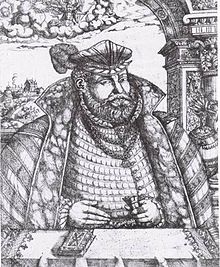John Frederick II of Saxony
| John Frederick II | |
|---|---|
 |
|
| Duke of Saxony | |
| Reign | 3 March 1554 – November 1566 |
| Predecessor | John Frederick I |
| Successor | John William |
| Landgrave of Thuringia | |
| Reign | 1554 – November 1566 |
| Predecessor | John Ernest |
| Successor | John William |
| Born |
8 January 1529 Torgau |
| Died | 19 May 1595 (aged 66) Schloss Steyer, Upper Austria |
| Burial | Morizkirche, Coburg |
| Spouse |
Agnes of Hesse Countess Palatine Elisabeth of Simmern-Sponheim |
| Issue |
John Casimir, Duke of Saxe-Coburg John Ernest, Duke of Saxe-Eisenach |
| House |
House of Wettin Ernestine Line |
| Father | John Frederick I, Elector of Saxony |
| Mother | Sibylle of Cleves |
| Religion | Lutheranism |
John Frederick II of Saxony (8 January 1529 – 19 May 1595), was Duke of Saxony (1554–1556).
He was the eldest son of John Frederick I, Elector of Saxony, and Sibylle of Cleves.
After the Battle of Mühlberg (24 April 1547) and the capture of his father, John Frederick II, along with his brother John William, succeeded their father as the regents of the lands still retained by their family. After the death of their father (1554), the brothers amicably divided the lands that were inherited from their father; even so, John Frederick II, remained as the exclusive regent for the family possessions. And even though he received Eisenach and Coburg in the divisionary treaty, John Frederick II chose Gotha as his place of residence while serving as head of the family.
John Frederick's political aspirations were still directed towards the reinstatement of his family's right to the title of "Elector of Saxony," as well as the re-establishment of the lands that were lost due to his father's imprisonment. In 1563 his prized general, Wilhelm von Grumbach attacked Würzburg, seized and plundered the city and compelled the chapter and the bishop to restore his lands. He was consequently placed under the imperial ban, but John Frederick II refused to obey the order of the Emperor Maximilian II to withdraw his forces. Meanwhile, Grumbach plotted the assassination of Saxon elector, Augustus; and proclamations were issued asking for assistance. Because of this, an end to alliances both inside and outside of Germany came about.
In November 1566 John Frederick was placed under the imperial ban, which had been placed against Grumbach earlier in the year, and Augustus marched against Gotha. Resistance from the people of Gotha was not forthcoming, and a mutiny led to the defeat of the town. Grumbach was delivered to his foes, and after being tortured, was executed at Gotha on 18 April 1567.
...
Wikipedia
